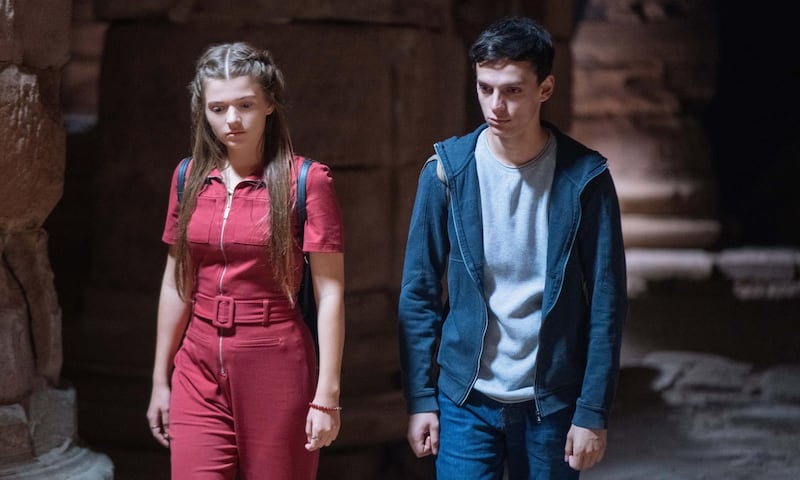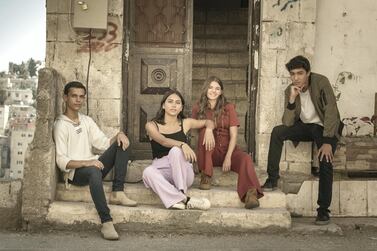Jordanians have expressed upset at Netflix's new supernatural teen drama Jinn, which they say portrays the country as having "loose morals" and normalises "inappropriate" behaviour.
Jinn, the first Arabic original series on Netflix, was filmed in the Jordanian capital Amman and the ancient city of Petra. It features a Jordanian cast and uses local dialects.
It has caused debate in Jordan, where some feel the series has “insulted” the country’s image and threatened its morals with scenes that show unmarried teenagers kissing.
One particular scene shared on social media depicts the Jordanian lead Salma Malhas sharing a kiss and holding hands with her love interest.
Opponents say the fact that the series takes place in Amman and features Jordanians “normalises” loose morals in a way that western entertainment, which is usually set in the West and in English, does not.
Khaled Shobaki, 25, a pharmacist from Amman, said he has seen the controversial scenes in question but has not watched an entire episode of the Netflix series.
“Even if such immorality is going on behind closed doors, we shouldn’t announce it to the world or make it seem like it’s a normal thing for Jordanians,” he said. “When it is in a Jordanian accent, such a series is telling us what our society should be like.
“It does not represent Jordanian morals – unlike the West, we are a closed society and such things should not be promoted as normal for us.”
Reem Mohammed, 28, who is a working mother of two, said that as a woman, she is against the promotion of a series that “gives the wrong impression of Jordanian women”.
“We are brought up to fear God, respect family and be responsible members of society. Most of us don’t go around having inappropriate relationships with men,” says Ms Mohammed, who has only seen brief scenes of the series posted on social media.
“I don’t want people across the world to think I, my sisters or other Jordanian women have loose morals because of a drama series that has no basis in reality.”
On social media, opposition was even fiercer, referring to Jinn as "porn" and calling for a boycott of Netflix. However, some people posted images and scenes from Arabic dramas that they say feature far stronger sexual content than Jinn's kiss between high school sweethearts.
The Royal Film Commission, the royal body which had licensed Jinn, came to the defence of its decision to allow the series to film in Jordan.
"It is important to remember that Jinn is fiction, not a documentary. Therefore, it is not meant to reflect reality," it said in a statement on Facebook.
Noting that users must subscribe to Netflix and choose to watch the series, rather than it being broadcast on an “open platform”, the commission said that watching it is “an issue of personal choice”.
Jordanian MPs and the government were scheduled to discuss the series in an emergency meeting in parliament on Sunday, but delayed the meeting to allow the country’s attorney general to proceed with an “official investigation”.
"The House of Representatives has followed up on reactions to the series Jinn, which was rejected by a large number of Jordanian people due to scenes that were described as alien to our culture, faith and social traditions," the joint parliamentary-government education committee said in a statement released to local media.
“While waiting for the judiciary to provide us with all documents and legislation governing this type of work, it was decided to postpone the meeting until further notice.”
Not all are opposed the show, though. Those defending Jinn have pointed out that Jordan has for years imported western entertainment that features sexual content, violence and foul language. Turkish melodramas that have been dubbed in Arabic also deal with risque themes such as prostitution, promiscuity and extramarital affairs.
Rawan, 22, a human resources administrator who did not want to give her last name, said that if an American, European or Lebanese woman was to wear revealing clothes on TV or is portrayed in a sexual situation, families are fine with watching that in their living room.
“But because a Jordanian woman is expressing love or romance, conservatives are up in arms, even though they haven’t seen it,” she said.
“I just don’t get what the fuss is about,” said Ahmed, 35, an engineer who also asked to use only his first name.
“We are all kissing behind trees. We all have girlfriends and boyfriends. We all know what is truly going on.
“In the end, God will judge people for their actions and morals, it is not up to us to hand down judgment.
“Besides, with everything going on in the region, are we really going to turn the world upside down over a kiss?”







